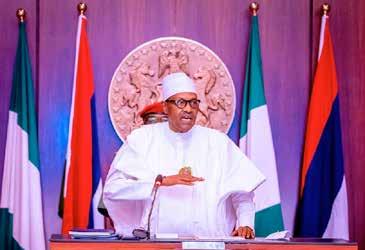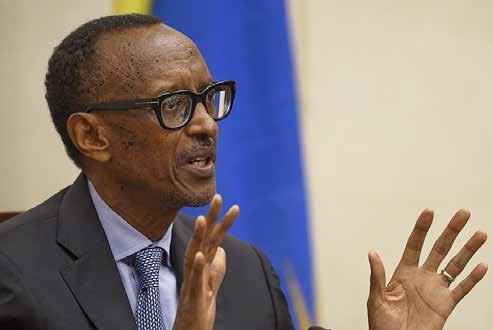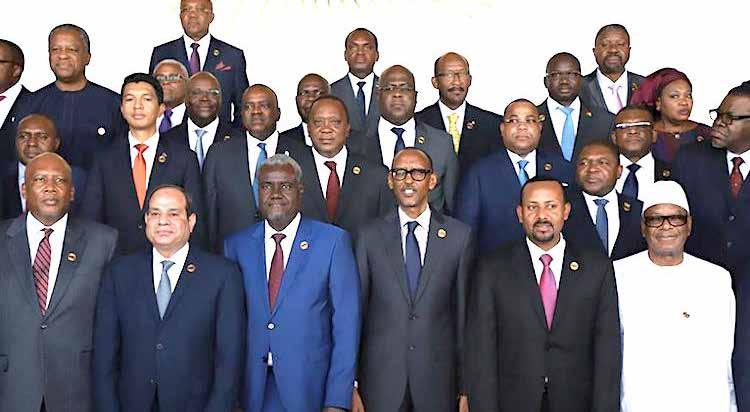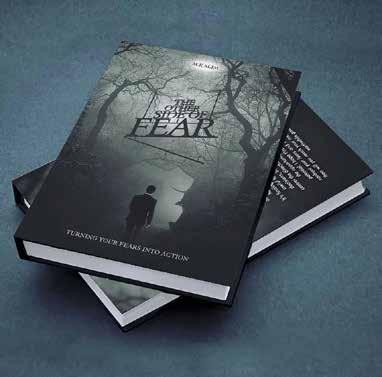
13 minute read
President Buhari congratulates Dr. Ngozi Okonjo-Iweala on
from The Voice magazine
President Buhari appoints new Ambassadors for Nigeria
The President of Nigeria, Muhammadu Buhari has approved the deployment of a former Minister of State for Defense, Demola Seriki, to Spain as Nigerian Ambassador while a former Minister of Mines and Steel, Sarafat Ishola, will serve as the High Commissioner to the United Kingdom. Ambassador Ishola, who is from Ogun State, is also an ally of a former Governor of the state, Senator Ibikunle Amosun.
Advertisement
Also, the Editor-in-Chief of The Guardian, Debo Adesina, will serve as Nigeria’s Ambassador to Togo. About 11 ambassadors were reappointed but eight were retained in their current countries of posting while three others were redeployed. The current Nigerian Ambassador to Ireland, Dr. Uzoma Emenike, who is also a career diplomat, was posted to the United States as the ambassador, while M.I. Bashir will serve as deputy ambassador. In all, there are 52 non-
career envoys posted out by the President and 43 career ambassadors based on the confirmed list from the Senate. According to the list, the eight ambassadors that will remain at their duty posts include: Ambassador Mohammed Rimi (United Arab Emirates), Ambassador Jidda Baba (China), Ambassador Gani Bura (Lebanon), Ambassador Yusuf Tuggar (Germany), Ambassador Baba Madugu (Switzerland) and Ambassador Deborah Illiya (Congo). Ambassador Tijani Muhammmad-Bande will also retain his position as the Permanent Representative to the United Nations, New York while Ambassador Adeyinka Asekun will remain the High Commissioner to Canada.
However, Ambassador Modupe Irele, who is the current Ambassador to France is redeployed to Hungary while Ambassador Eniola Ajayi, the Ambassador to Hungary is redeployed to the Netherlands. For non-career diplomats, Ambassador Ms Ijeoma Chineyerem will resume as the Ambassador to Ireland, Ambassador Oma Djebah will be posted to Thailand, Ambassador Abdulahi Shehu (Russia), Ambassador Haruna Manta (South Africa), Ambassador Kayode Laro (France), Ambassador Paul Adikwu (The Vatican), Ambassador Abubakar Moriki (Japan), Ambassador Mrs. Opunimi Akinkugbe (Greece) and Ambassador Ali Magashi (South Korea)
Other postings include Ambassador M.O. Abam (Italy), Ambassador N.A. Kolo (Israel), Ambassador A. Sule (India), Ambassador G.Y. Hamza (Ghana), Ambassador A.N. Madubike (Australia) and Ambassador O.C Onowu (Belgium). It would be recalled that Ambassador Onowu has earlier served in the Netherlands before returning to the headquarters in Abuja and finally confirmed as an Ambassador of Nigeria The remaining appointees are expected to serve as deputy ambassadors or heads of mission. They include A.E. Alleboy (Deputy Ambassador to France), G.E. Edokpa (Deputy Permanent Representative to The UN), Ben Okoyen (Cuba), G.M. Okeke (Deputy Head of Mission to Switzerland), S. Sani to London, (Deputy High Commissioner to UK), I.A Iwejuo (Ethiopia as Deputy Ambassador), I.A. Alatishe (Deputy Ambassador to Russia) and I.R. Ocheni (Germany). Congratulations to all the new Nigerian diplomats.

An Amsterdam person who makes the difference: Veronica van de Kamp
In the run-up to International Women’s Day on March 8, 12 large portraits of strong Amsterdam women hang over the city of Amsterdam. These women are special because they have been selected because they are doing something positive for the city of Amsterdam. Media entrepreneur Raja Felgata took the photos. They can be seen at Mercatorplein and at Waterlooplein from 1st to 10th March 2021. You may have admired them before on the Buikslotermeerplein or Bijlmerplein. One of those portrayed is Veronica van de Kamp, an African woman married to Dutch and does a lot within her African community in the Netherlands to show how integration could take place properly by getting to know each other better in the community. On Monday, March 8, Amsterdam will celebrate International Women’s Day with an online meeting, for which you can register.
Source of inspiration
Since 2017, Veronica has been taking care of her 3 children still living at home on her own. Her 24-year-old son has disability. “He’s in a wheelchair and doesn’t talk. But he feels and sees that I am the best mother to him. He is really an inspiration to me. I see it as a gift to have and care for a child with special needs. ” says Veronica As a Ghanaian Amsterdammer, she likes to express the love and pride with which she does this to inspire others who may be going through the same or similar situation in their family. She is therefore an informal care ambassador for the Ghanaian community. “As informal carers we do something from our heart, we provide a home and we can be proud of that. I want to let care givers in my community know that long-term care for someone dear to you does not mean that everything is lost. ”
Opportunities
“We have so many opportunities and possibilities in the Netherlands, in Amsterdam. The problem is, if you don’t do anything, nothing will happen. I tell people that. I also tell them that they are not alone, that help is possible. And that you should ask for that help, because that can be a barrier for some people in my community. ”
Mother figure
Veronica does a lot more. You could say she acts as a mother figure for the Ghanaian community in Amsterdam. In addition to fundraising campaigns for projects in her motherland, she informs African Amsterdammers about the most diverse subjects. ‘You have to make something positive out of every situation you find yourself in’ With her foundation, Stichting GAM, she creates and organizes TV programs, workshops, debates and theater 7 days a week. She already played theater in her native country Ghana before moving to the Netherlands. She simply loves it. According to Veronica, it creates room for discussion and theater makes everything lighter. Also tough topics such as HIV, teenage pregnancy, homosexuality and alcoholism and many other subjects are dealt with through drama sketches. Veronica: “There are many taboos in our community. Years ago, I realized that not everyone has sufficient knowledge about Dutch society. I use my own experience to tell about the many opportunities that exist. You have to make something

positive out of it. ”
Appreciation and pride
“My husband passed away in 2017, but I’m still going strong. It gives me positive energy to give something good to the city. The women in my community inspire me enormously, and vice versa, I am highly appreciated and so do I appreciate them. I always tell them that we should be proud of our femininity, that we should cherish it. That you can do anything if you want. And that you shouldn’t accept it when someone tries to get you or put you down. On International Women’s Day, we show the world how important we are. We claim this one day in the year. ” And for that reason, the city in appreciation of women has put up this 12 large portraits of strong Amsterdam women for the people to see. There is a story behind each of those 12 women. Amsterdam Women’s Day Amsterdammers can experience the livestream event ‘Influence with impact in Amsterdam’ on International Women’s Day 2021. A number of the women portrayed are on the program as speakers.
Monday, March 8, 2021 Time: 11.30 am - 1.30 pm
Inspirational women such as Mona van den Berg and Lisa van Ginneken would talk about photojournalism and the representation of women in it, prejudices about trans women and how things can be done differently. Cultural entrepreneur Hui-Hui Pan would talk about the representation of Asian Dutch. Alderman Rutger Groot Wassink opens the meeting with an interview about International Women’s Day in Amsterdam.
Hostesses are Raja Felgata and Hajar Fallah, who organized this day on behalf of the municipality of Amsterdam. Entrepreneur Biba de Jongh makes her location Rebel HQ available and asks the speakers questions.


Sign up for ‘Influence with impact’ Also on the occasion, specially designed pins for 1,000 police officers, 300 neighborhood fathers and mothers would receive Amsterdam Hero Pin.
President Paul Kagame: A Powerful African Voice
Paul Kagame, the President of Rwanda and also the former Chairperson of the African Union (2018-2019) has called out Europe and North America for hoarding vaccines. He is accusing these Western nations of bulk-buying excess doses directly from manufacturers which limits supply and secures better deals to the detriment of governments with less purchasing clout. During the virtual 2021 World Economic Forum, continental peer South African President Cyril Ramaphosa also publicly accused so-called developed countries of “vaccine nationalism.” In an op-ed titled ‘Until Africans get the Covid vaccinations they need, the whole world will suffer,’ the outspoken Rwandan President voiced his concerns about the economic disparities surrounding the global coronavirus vaccine campaigns worldwide. He explicitly challenged the “decades-old contradictions of the world order” as he called not for charity, but for fairness and transparency to ensure equitable access to vaccines globally during this unprecedented COVID-19 pandemic. Pan-African discourse characteristic of the African Union’s champion of domestic health financing as over the years President Kagame has unapologetically put Western authorities in their place — blatantly calling out injustices against the Motherland and reiterating in several words worthy of his position as a world leader, “African Lives Matter!”
Here are 7 times Paul Kagame shut the West all the way down: 1. “We are Not People to Be Belittled!” In a speech in which he called out the BBC’s “politics” and the “lies” and “hypocrisy” of much of the discourse concerning the African continent in the Western media, he expressed that the West often assumed an authoritative tone of what Africans should be and should do. “We have fought for our freedoms right from childhood - some of us. These people that just run around cannot force their culture on us. They are not humble. They think they are better than everybody. But it is not God-given. God created us equal. We shall never ever be apologetic for standing up for our rights! And there are no better people than us in our country in our affairs.” 2. “How About Those In Your Country Who Committed Crimes in My Country?” How is “universal jurisdiction” universal if it is only one way? The Pan-Africanist president asked in response to a French judge who sought to try Rwandans in France in a one-sided power play — and without recognizing crimes of French citizens committed in Rwanda during the country’s genocide. “For example the case in France, a judge somewhere in rural areas in France. One of the village judges somewhere decides that he is going to indict leaders in Rwanda. And talks about all types of things that happened in Rwanda and blames Rwandans. At the same time, there is a bad history between us that was actually during the genocide. There are many things that happened that involved some people from France.” 3. “Africa Does Not Need Adult Supervision!” At a meeting that saw several high-ranking officials present to discuss Afro-Euro relations, Kagame took issue with the condescending and patronizing approach to African countries


as a way to dictate and control policies and international agreements. “The attitude of adult supervision needs to be left in the past. Rights and wrongs can be found everywhere. We must resist the temptation to reduce Africa to blanket judgments and generalizations. There cannot be a partnership of mutual respect when one party lacks values while the other party is a fully-formed moral agent”. He told the European leaders present that what Africa needs is fair trade instead of a misplaced or misguided sense of parental authority. 4. “Africa and Rwanda Decide What We Want for Ourselves Going Forward” Kagame called out the manipulative policies to control African nations in the guise of trade agreements and development. He gave concrete examples of Rwanda being “punished” by the United States simply for wanting to grow economically by way of its textile industry which would leave it no longer dependent on the purchase of second-hand clothing exported from the US. In addition, he mentioned the United States’ public refusal to refer to the “genocide in Rwanda against the Tutsi” for still-undisclosed reasons when even the United Nations and the entire international community has officially adopted this phrasing of the historic incident. “Imagine powerful United States as it is and it is arguing over this non-issue that has been sorted out at the UN. We cannot understand what is behind it or who benefits from it. This creates an atmosphere of unpredictability and this is how it becomes therefore difficult for Rwanda to predict what is going to happen in terms of the relationship. We suffer from one fact that there is so much talk about sovereignty and you found out that we do not qualify for these sovereign rights. Every other person wants to decide for Rwanda and Africa. The best thing is to let Africa and Rwanda be partners with powerful, developed countries.” 5. “These Are Our Human Rights. Who Are You?” The No-Nonsense President explained very simply that the European Union is not in a position to define what “human rights” are and should look like for Africans and Africa. He stated quite matter of factly that human rights in Africa belong to Africans and not for anyone else to claim or dictate as Africans have been — and are still, fighting for human rights in many ways and facets of life from Western entities and know the true meaning of this fight better than anyone else ever could. “You really need to stop this superiority complex nonsense about human rights. You think you are the only ones who respect human rights while for others it is about berating human rights. No, we fought for human rights and freedoms for our people much better and more than anyone — including the people who keep talking about this nonsense.” 6. “Some People Accuse Others of Doing Things That They Do Even More” After receiving a letter from the British PM making accusations about human rights, the Rwandan president took a firm stand against the hypocrisy in Western international meddling in continental affairs while conveniently ignoring issues — at times even much worse, on their own soil. “I think it is wrong. These people were here talking about concerns they have about justice for people. Don’t you think the first place where they should have taken their concerns is within their own system? You are concerned about justice? How about justice for the people in Rwanda who were killed during the genocide and the people who were part of it directly — not directly, are sitting there in your country where you are protecting and where I think they have been given residence or citizenship.” 7. “There is No way I can Allow Anybody to

Lower My value to That Level” The president with the candid tongue corrected a US official who attempted to express that China is the only country exploiting the African continent. He did not mince words. “Some of the friends we deal with in the West. They come with this mindset that Africa is indifferent to human rights, to democracy, to freedom so they come to do it for us. Or to tell you that you should be doing it on their demands. And we are saying, ‘No.’ We as human beings. No human being anywhere would want to live by dictates by someone else. My understanding is that we are all human beings.” African Lives Matter! Indeed. True to the moves of an authentic Pan-African, Paul Kagame is still advocating for the well-being of all Africans on the continent. Now, in the form of coronavirus vaccines. He ended his piece of call-to-action with the following: “Africa is not sitting back and waiting for charity. We have learned our lessons from the past. All we ask for is transparency and fairness in vaccine access, not the protectionism currently in play. Ensuring equitable access to vaccines globally during a pandemic is not only a moral issue but an economic imperative to protect the wellbeing of people everywhere. But when will Africa get the protection it needs? If all lives are equal, why isn’t access to vaccines?”












